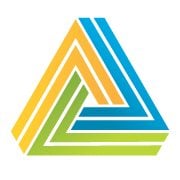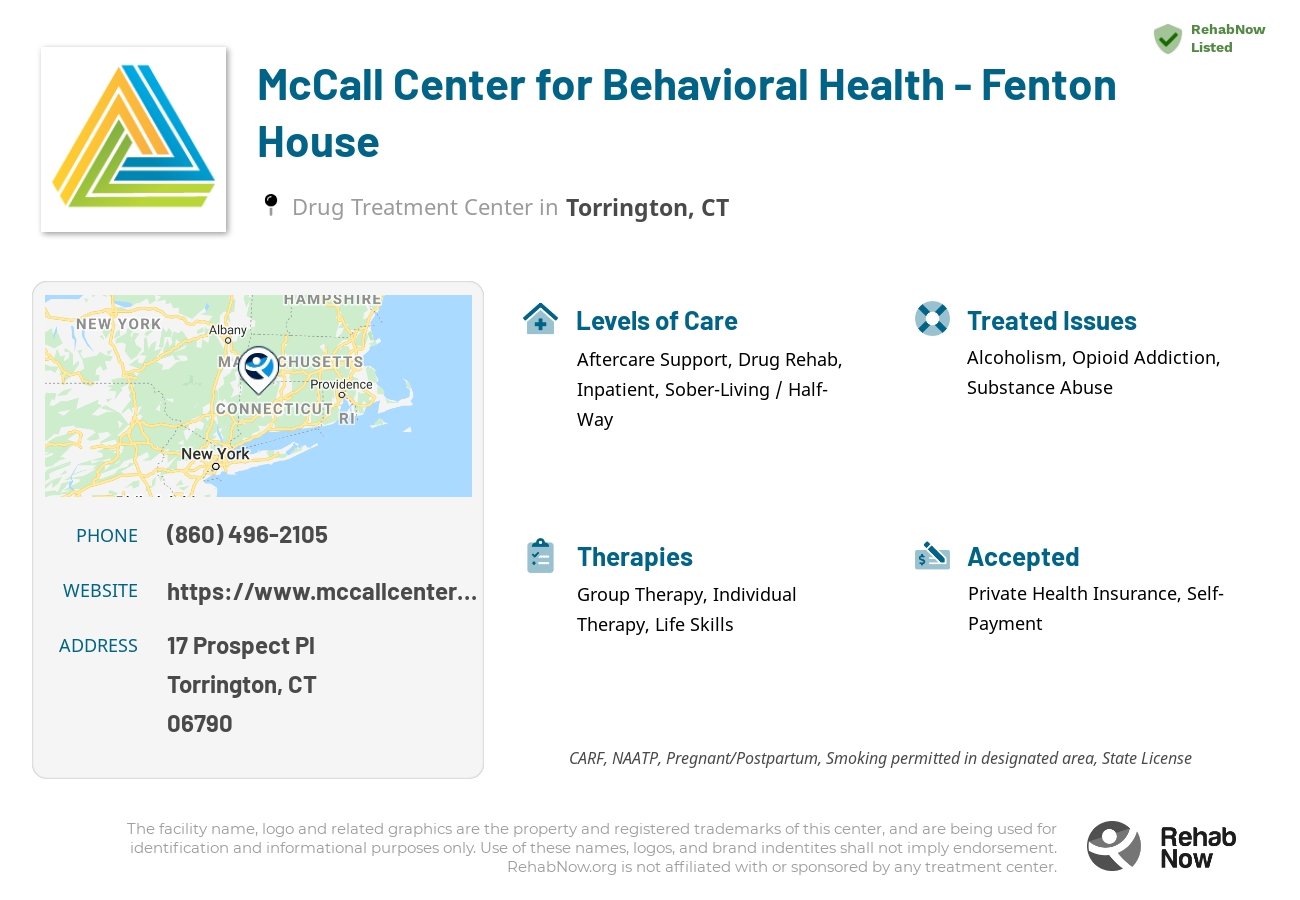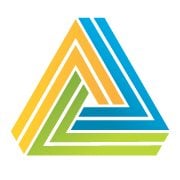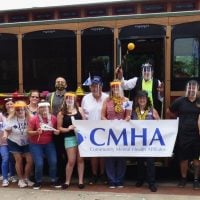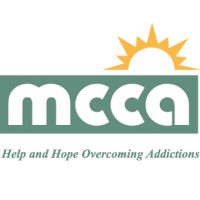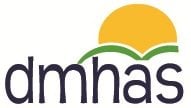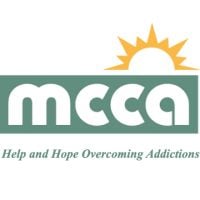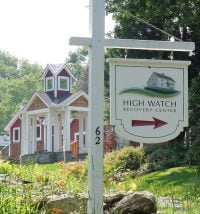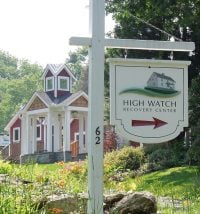McCall Center for Behavioral Health - Fenton House
Drug Rehab Center in Torrington, Connecticut
The McCall Center for Behavioral Health - Fenton House in Torrington, Connecticut offers specialized care for individuals struggling with addiction and substance abuse, providing a comprehensive range of evidence-based treatments and services to address physical, psychological, and social aspects of addiction and reduce the risk of relapse.
About This Connecticut Facility
McCall Center for Behavioral Health - Fenton House is a 6-bed addiction treatment facility located in Torrington, Connecticut. Their core services are focused on treating addiction, mental health challenges, and substance abuse. This includes providing aftercare support, drug rehab, inpatient, residential, outpatient, and detox levels of care. This center is accredited by CARF and holds a state license.
McCall Center for Behavioral Health - Fenton House offers a wide range of services to help those suffering from addiction, mental health challenges, and substance abuse. Their comprehensive addiction treatment services include individual, group and family therapy, cognitive behavioral therapy, life skills development and relapse prevention services. Furthermore, the facility also offers medication management and psychiatric evaluation. It also accepts private health insurance for those who have coverage. The goal of this center is to provide evidence-based care in a safe and confidential environment to help individuals facing addiction build a strong foundation for recovery.
Genders
Ages
Modality
Additional
Accreditations
State License

CARF
The Commission on Accreditation of Rehabilitation Facilities (CARF) is a non-profit organization that specifically accredits rehab organizations. Founded in 1966, CARF's, mission is to help service providers like rehab facilities maintain high standards of care.
Conditions and Issues Treated
A drug abuser needs help because if no one helps them, they will not leave their vicious circle.
People who abuse drugs are likely to suffer from an addiction, which can cause serious health problems. It can also cause quarrels with people around them. It is common for drug abusers to have difficulty holding down jobs or relationships, but sometimes people around them can be quite tolerant. There are cases where the families of the drug abusers do not want to see them get any help, and the subject becomes controversial.
When it comes to helping drug abusers get sober, there are many options to choose from. It is essential to state that there is no “correct” way of doing things. People are different, and they need different types of help to get over their addiction.
Opioid addiction treatment should be done in a medically supervised drug rehab. Opioid addiction treatment will include detoxification and drug rehab counseling to help both the user and their loved ones learn how to live a successful sober lifestyle. Methadone, buprenorphine, and naltrexone are three medications that can help treat opioid addiction. Individual drug rehab counseling sessions can be helpful to discuss any questions or concerns with the drug treatment program.
Levels of Care Offered at McCall Center for Behavioral Health - Fenton House
This center offers a variety of custom treatment tailored to individual recovery. Currently available are Aftercare Support, Drug Rehab, Inpatient, Residential, Sober-Living / Half-Way, with additional therapies available as listed below.
Inpatient treatment is an option that provides addicts with a supportive environment in which they can stop using. This type of intensive care and supervision is appropriate for those who were unable to quit on their own or need more structure than they could get from outpatient treatment, such as the addict most in need of this level of care.
The goal of inpatient rehab is for the addict to stay focused on sobriety and remain free of mood altering substances. Inpatient treatment programs usually offer the following: detox, therapy groups, one-on-one counseling, medication management and aftercare planning.
Sober Living Homes are used in drug rehab to help former addicts maintain sobriety. The staff provides the residents with a safe and supportive living environment to learn how to live a sober life. The staff members also provide the residents with resources to equip themselves better to live a sober life. They also provide them with opportunities for exercise, many of which encourage learning coping mechanisms that will be helpful later on.
Residential treatment programs are those that offer housing and meals in addition to substance abuse treatment. Rehab facilities that offer residential treatment allow patients to focus solely on recovery, in an environment totally separate from their lives. Some rehab centers specialize in short-term residential treatment (a few days to a week or two), while others solely provide treatment on a long-term basis (several weeks to months). Some offer both, and tailor treatment to the patient’s individual requirements.
Aftercare is a part of drug rehabilitation. It is also known as “post-treatment support.” Aftercare programs are available for addicts after they complete drug rehab. It is often the final step in the recovery process. The goal of aftercare is to ensure that addicts maintain their achievements in rehab and do not relapse. Professionals generally provide aftercare (including addiction therapists, physicians, social workers, psychologists) and involve individual and group therapy sessions.
Therapies & Programs
Individual therapy is a critical component of addiction recovery. It allows the patients to go deep into their core issues and discover how to handle those problems better. Therapy can be conducted in individual sessions as well as group settings. In individual therapy for addiction, the patient meets with their therapist one-on-one to focus on the underlying issues. This allows patients to open up and discuss personal topics they may not feel comfortable discussing in a group setting. This type of therapy can help develop solutions specific to each patient, which helps speed up the recovery process.
Group therapy helps prevent addicts from feeling isolated or unique in their situation by offering a sense of comfort and fellowship. It also creates a forum for addicts to build their support systems and learn from each other. The group therapy sessions at McCall Center for Behavioral Health - Fenton House occur in a group setting rather than one-on-one to create a safer, controlled environment where addicts feel comfortable.
The best drug treatment centers offer various services to help addicts learn how to live without drugs. Since addiction is a chronic physical and mental illness, addicts need to learn as many life skills as possible to help them stay clean and sober.
Many drug treatment centers like McCall Center for Behavioral Health - Fenton House offer life skills activities as part of their addiction recovery programs. Examples include cooking classes, employment training, resume writing seminars, parenting classes, and computer training. When addicts have various life skills to lean on, they’re better equipped to put their addiction behind them for good.
The primary goal of life skills activities at drug treatment centers like McCall Center for Behavioral Health - Fenton House is to help addicts recover from addiction and learn how to live a useful, productive life. Life skills activities help addicts find employment, take care of their families, and give back to the community. After learning about these various life skills, addicts are better prepared to return to society and lead happy healthy lives.
Payment Options Accepted
For specific insurance or payment methods please contact us.
Is your insurance accepted?
Ask an expert, call (888) 674-0062
McCall Center for Behavioral Health Associated Centers
Discover treatment facilities under the same provider.
- McCall Center for Behavioral Health - McCall House in Torrington, CT
- McCall Center for Behavioral Health in Torrington, CT
- McCall Center - Torrington in Torrington, CT
- McCall Center for Behavioral Health - Administrative Offices in Torrington, CT
- McCall Center for Behavioral Health in Torrington, CT
Learn More About McCall Center for Behavioral Health Centers
Additional Details
Specifics, location, and helpful extra information.
Torrington, Connecticut 6790 Phone Number(860) 496-2105 Meta DetailsUpdated November 25, 2023
Staff Verified
Patient Reviews
There are no reviews yet. Be the first one to write one.
Torrington, Connecticut Addiction Information
Connecticut has a higher rate of substance abuse and addiction than the national average. The state ranks in the top 10 in the country for illicit drug dependence among those ages 18 to 25. In 2010, there were 9,211 people admitted to an alcohol treatment facility for alcohol abuse combined with a secondary drug. Connecticut ranked fifth in the United States of America for the number of fatalities involving drunk driving in 2014.
About 8% of Torrington residents reported using illicit drugs in the past month. Most commonly abused drugs in Torrington include marijuana, cocaine, heroin, and prescription opioids. The abuse of these substances often leads to addictions and substance use disorders. Drug rehab centers can provide the necessary treatment and support to help individuals struggling with addiction get sober.
Treatment in Nearby Cities
- Mansfield Center, CT (47.7 mi.)
- Norwalk, CT (50.1 mi.)
- New Canaan, CT (49.8 mi.)
- Chicopee, CT (35.3 mi.)
- Groton, CT (62.7 mi.)
Centers near McCall Center for Behavioral Health - Fenton House
The facility name, logo and brand are the property and registered trademarks of McCall Center for Behavioral Health - Fenton House, and are being used for identification and informational purposes only. Use of these names, logos and brands shall not imply endorsement. RehabNow.org is not affiliated with or sponsored by McCall Center for Behavioral Health - Fenton House.
